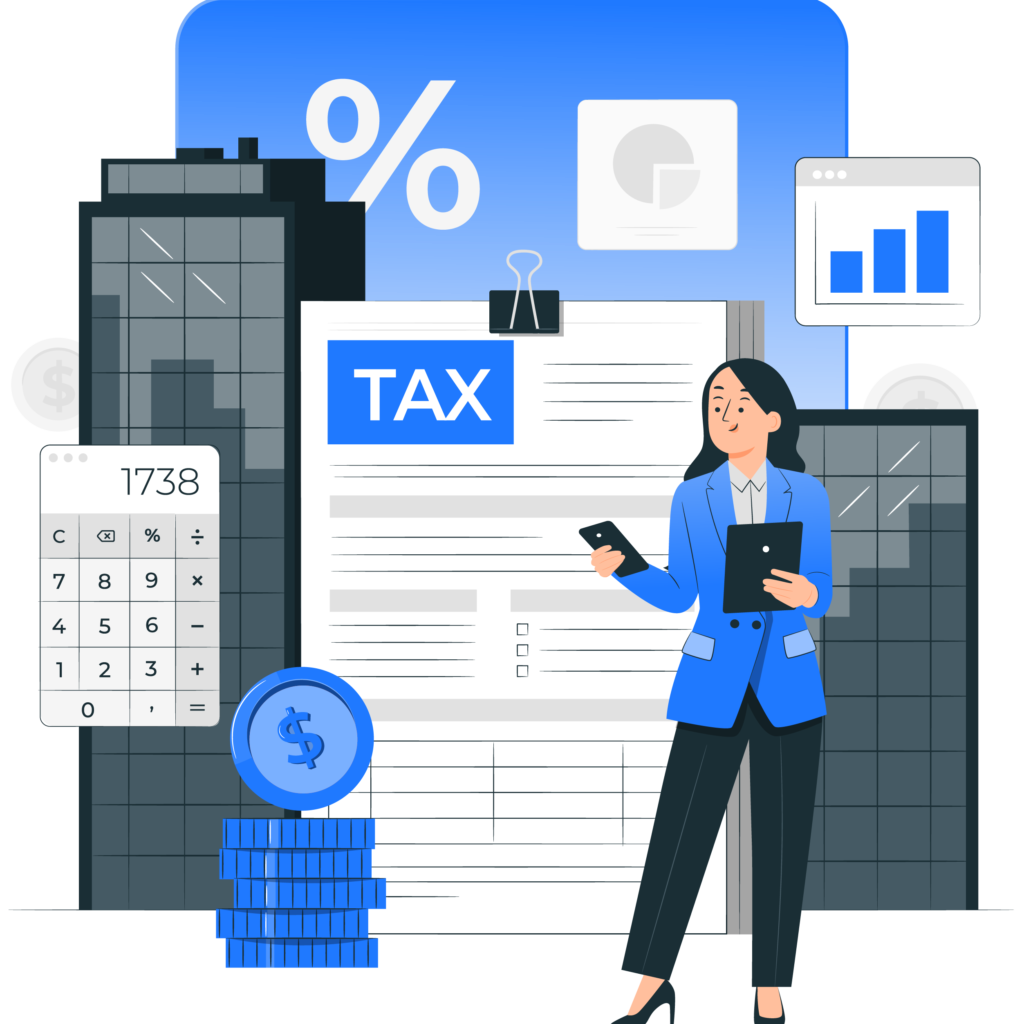HomeMake Your Business Tax Efficie...
Make Your Business Tax Efficient CFO Horizon

Make Your Business Tax Efficient - Comprehensive Solutions by CFO Horizon
CFO Horizon to your rescue – Let us handle all the paperwork
While we call you, get some insights into what you are getting into.
At CFO Horizon, we provide comprehensive accounting and compliance services designed to empower firms like yours to thrive and succeed.
What Taxes to Know?
- The amount of tax your business owes is intricately tied to its structure. If you operate as a sole trader or a partnership, your primary tax responsibility is income tax – a familiar concept for those with prior employment experience.
- However, for businesses structured as limited companies, the tax scenario becomes more nuanced. The company, a distinct legal entity from you, is liable for corporation tax on its profits. Herein lies a crucial decision point: determining how to extract income from the company, a process that may entail additional taxation.
- In addition to income tax and corporation tax, your business might encounter other tax obligations, such as business rates, VAT, and contributions to the Employer's National Insurance (NI).
- Navigating the intricacies of business tax requires due diligence, and seeking expert advice from an accountant is strongly recommended. This ensures not only compliance but also guards against the risk of overpaying, a scenario best avoided.
- While the prospect of paying too little and facing penalties from HMRC is a genuine concern, there are legitimate avenues to reduce your tax burden strategically – provided you're well-informed and guided by professional expertise.
Deductible Expenses in Your Business
A savvy method to curtail your tax liability involves leveraging legitimate deductible business expenses. Consider this sampling of eligible categories:
Office Costs
Encompassing basic stationery to phone bills, every essential for your workspace qualifies.
Travel
From fuel to train and bus fares, even parking expenses fall under this category.
Staff Welfare
Any expenditure incurred related to staff and welfare activities can be claimed as expenses.
Staff Costs
Both salaries and subcontractor costs are recognized, contributing to potential deductions.
Stock and Raw Materials
Anything procured for resale can qualify as a deductible business expense.
Financial Outlay
Bank charges and insurance premiums fall within the ambit of legitimate deductions.
Running Your Premises
From heating and lighting to business rates, all associated costs are deemed legitimate.
Marketing
Advertising and marketing expenditures, including investments in your website’s upkeep, are eligible for deduction.
Boost Cash Flow with VAT Accounting
While VAT accounting might seem mundane, it can enhance your cash flow if approached strategically.
Consider this: you can receive VAT income and retain it briefly before disbursing it. This tactic grants you access to liquid funds precisely when you need them most. Uncover simple tips to prolong your cash retention:
01
Optimize Invoice Payments
Set up invoices for swift payment, strategically aligning them to postpone VAT settlement until the subsequent quarter.
02
Negotiate Supplier Terms
Negotiate terms with suppliers that afford you maximum flexibility in settling payments, providing a cushion for your cash flow.
03
Strategic Timing for Business Expenses
Time significant business expenses, especially high-value purchases, toward the end of the quarter or just after the VAT return period. This strategic timing effectively trims your VAT bill.
04
Explore the 'Flat Rate' Scheme
For businesses with a turnover of up to £150,000, delve into the advantages of the ‘flat rate’ scheme. This simplified approach allows you to pay a predetermined quarterly percentage tailored to your business sector, eliminating the need for intricate preparations. It’s a time and cost-saving alternative worth considering.
Make Use of Tax Reliefs
Time significant business expenses, especially high-value purchases, toward the end of the quarter or just after the VAT return period. This strategic timing effectively trims your VAT bill.
Research and Development (R&D)
Leverage tax credits for your R&D initiatives, a government-backed scheme designed to reward innovation. Astonishingly, a substantial £84 billion in unclaimed tax relief awaits SMEs across the UK, making this an untapped resource for many small businesses.
Patent Tax Relief
Make Your Business Tax Efficient CFO Horizon – Google DocsSeize the benefits of your innovative efforts by claiming tax relief on profits stemming from patented inventions. While the guidance of an accountant may be beneficial, the potential returns make it a worthwhile avenue for exploration, particularly if your business holds patents.
Employment Allowance
If your business currently pays Class 1 National Insurance, there’s an opportunity to save up to £3,000 annually on this bill. This represents a tangible saving that could be redirected towards furthering your business goals.
Business Rates
Uncover tax relief for your business property with a rateable value of up to £15,000. In numerous cases, strategic maneuvers can even reduce the business rates bill to zero, providing a substantial financial advantage.
How to Start Business Tax Efficient?
Fill Form
Simply fill out the above form to get started.
Make Payment
No additional compliance in most cases
Our Expert Will Start the Process
Our expert will connect with you & advise on documents.
Why CFO Horizon?
Startup Friendly
10k Business Registration & Counting
Affordable & Transparent
No Hidden Fee
Secure online payment
On-Time Deliver
We value time and hence would never miss a deadline
150+ Experts
A massive team of experts is just a call away!
100% Confidentiality
We maintain a high level of confidentiality of client information & information security management.
Live Status
You can track your Status of services live, which brings clarity and reliability to our system.
Turn to CFO Horizon for Any Financial Guidance Needed!
Getting in touch with us is Absolutely FREE!!!
Plus, you might grab some FREE Financial Advice while we are talking.
We are based in India and ready to serve businesses worldwide.